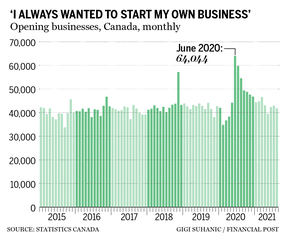The Capitalist Manifesto: The entrepreneurial spirit is alive and well and the pandemic proved it

Entrepreneurs play a big role in capitalism and new technologies are making it easier than ever to start a business

Article content
Capitalism has created more prosperity and progress for more people than any system in human history. On the 30th anniversary of the official end of the Soviet Union, join the National Post and Financial Post in a series saluting the unfashionable yet awesome power of the free-market system.
Advertisement
Story continues below
This advertisement has not loaded yet, but your article continues below.
Article content
It was the end of September of 2020 when mural-artist-turned-small-business-owner Tina Nguyen realized the power of social media in growing her scrunchie-making operation.
After two of her videos on TikTok went viral in a week, she woke up one day to see her phone clogged with sales notifications from her Shopify merchant store. In the videos, the 28-year-old from Belleville, Ont., gave her followers a behind-the-scenes peek of her work life. She showcased her mother’s precision cutting cloth — sometimes working to midnight — and the work of her father stapling tags and wrapping orders for her company, XXL Scrunchie & Co, aptly named after the supersized version of the hair-tie that’s her staple product.
At the time, the videos doubled her following to 100,000 users (they have now accumulated more than five million combined views). Order labels jetted out the printer, stacking so high that Nguyen — for fun and to film a TikTok, of course — spread them out in a line that went from her second-floor bedroom, through the hallway, down the stairs and into the kitchen.
Advertisement
Story continues below
This advertisement has not loaded yet, but your article continues below.
Article content
“We had over 100 orders that day,” Nguyen said, nearly ten times the typical daily order flow since launching the business at the beginning of that year.
“I checked my emails just to make sure no one messed up…. Then I got set up to pack right away because I knew it was going to be a long day.”

The COVID recession will be remembered for the epic drop in employment, which saw more than two million Canadians lose their jobs at the height of lockdowns last spring, and a deep pullback, which caused GDP to plunge nearly 39 per cent , annualized, in the second quarter last year. In some corners of the economy, though, the combination of desperation, free time and new digital technologies such as TikTok and other platforms stoked a revival of entrepreneurship.
Advertisement
Story continues below
This advertisement has not loaded yet, but your article continues below.
Article content
“One of the benefits of capitalism and the free market is if you have a good idea that you can benefit from, you have an incentive to innovate and start a business,” said Charles St-Arnaud, chief economist at Alberta Central and former economist at the Bank of Canada.
St-Arnaud was quick to point out that Canada isn’t a pure free market, and the pandemic was hardly a capitalist crucible: unprecedented fiscal and monetary supports left households with record levels of savings, and government lockdowns left them with limited places to spend it. Discretionary options like dining out and travel were out, and demand for retail shifted online, where e-commerce sales hit $38.3 billion in 2020. Enterprising minds took advantage.
Advertisement
Story continues below
This advertisement has not loaded yet, but your article continues below.
Article content
New business openings surged to a pandemic high of 64,000 in June 2020, a 46 per cent increase from the same time in 2019. Unable to go anywhere, people had extra time on their hands, which may have prompted some to work on ideas that had been kicking around in their heads. “All of those factors created the perfect environment in some ways,” St-Arnaud said of the rise in entrepreneurship.

That was the case for Celine Guo, the 25-year-old founder of Sunday Glow, a company that creates personalized skincare regimens using imported Korean beauty products. She returned to her home in Richmond Hill, Ont., in March 2020 after she completed a year-long program at Boston University that centred on creating media businesses. The end of the program offers an internship that she wasn’t able to take as the COVID-19 virus quickly began spreading around the globe. Rather than feeling like she missed out, she was excited.
Advertisement
Story continues below
This advertisement has not loaded yet, but your article continues below.
Article content
“I thought to myself that I can finally work on my own stuff. It was a moment that I waited so long for,” Guo said. “I always wanted to start my own business and that was the moment. So without any hesitation, I just went right in.”
Even with the economy grinding to a halt, she was sure her business plans were sound. With nothing else to do, plastering on face masks from quality Korean beauty companies was a cheap luxury people would still buy to maintain a ritual of self-care in trying times, she said.
I thought to myself that I can finally work on my own stuff. It was a moment that I waited so long for
Celine Guo
However, with an initial investment of $200, which went to securing a small batch of product, building a Shopify website and doing a bit of Facebook marketing, business was moving at a snail’s pace through the summer and fall last year. It wasn’t until winter when she began posting regularly on TikTok — gaining inspiration from other small business owners on the platform — that sales began growing.
Advertisement
Story continues below
This advertisement has not loaded yet, but your article continues below.
Article content
The allure and payoff for small business owners venturing on TikTok is, in part, in its nascency and the design of its platform, which help boost exposure, said Matthew Stradiotto, vice-president of digital at Argyle Public Relationships. The app launched in 2016 but its popularity skyrocketed in the pandemic as people spent more time online — this year, more than one billion users have opened the app to scroll through its whole-screen, vertical videos. Because it’s relatively new, content on the platform is likely to spread wider, Stradiotto said, as there’s less saturation.

On top of that, TikTok is unique in the role authenticity plays in amassing followings and likes, he said. People don’t want to see highly curated content of photogenic models and staged product shots. They want to get a behind-the-scenes look into the day-to-day of the business owner, seeing what they ate for lunch, how they package orders, sometimes even how they make the product.
Advertisement
Story continues below
This advertisement has not loaded yet, but your article continues below.
Article content
Both Guo and Nguyen agreed. “People just want that authenticity,” Nguyen said.
All those factors combined make it ripe ground for the tech-savvy small business owner to convert users into buyers.
It’s become such an important, easily accessible tool in the entrepreneur’s kit, that the Canadian Chamber of Commerce blasted an event for small business owners on Nov. 9 hosted by TikTok. Canadian TikTok staffers repeated some of the points above, while also giving tips to owners on how to be successful on the app.
For the younger, digitally native entrepreneurs, their natural familiarity with online communication only serves to help them rack up sales, said Stradiotto.
After posting the two videos of Nguyen’s mother and father, the scrunchie-maker saw one of her best sales periods. In March and April last year, running the business from her family home, she raked in $26,000 in sales. Her combined sales in August and September ballooned to $85,000, with much of that coming in after her viral videos.
Advertisement
Story continues below
This advertisement has not loaded yet, but your article continues below.
Article content
Guo declined to share sales figures, but said after a TikTok goes viral, she sees a 200 per cent increase in orders. She’s ditched her old Facebook marketing strategy and focuses more effort on TikTok and building her community.
-

The Capitalist Manifesto: W. Brett Wilson on his career as a capitalist with a heart
-

The Capitalist Manifesto: Terence Corcoran on why capitalists need to answer Piketty, the world’s most dangerous socialist
-

The Capitalist Manifesto: How capitalism and Canada made Prem Watsa
-

The Capitalist Manifesto: Capitalism allows the individual to shape society for the better and it needs to be protected
The advancement in social media and online marketplaces have made accessibility to entrepreneurship easier, St-Arnaud said.
“Had the pandemic happened 10 years ago … this wouldn’t have been as big of a phenomenon,” he said.
The success Nguyen has amassed because of social media was something she couldn’t imagine. In her five-year plan, she hoped to rent a warehouse by the end and make six-figures in sales. Within two years, she’s landed a warehouse unit and is poised to break seven figures.
“Now my five-year plan is to own my own warehouse building,” she said.
Financial Post
• Email: [email protected] | Twitter: biancabharti
Advertisement
Story continues below
This advertisement has not loaded yet, but your article continues below.









